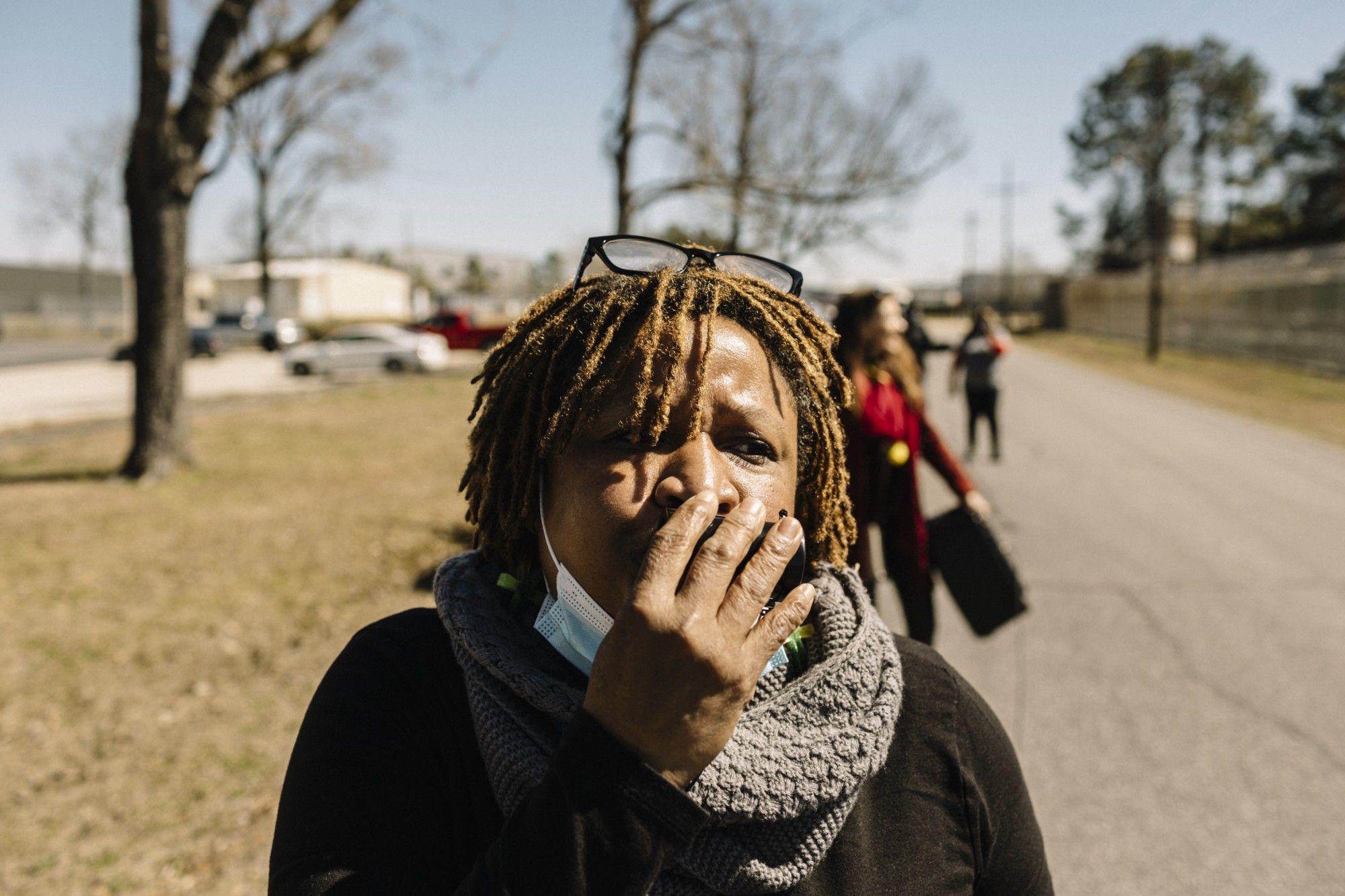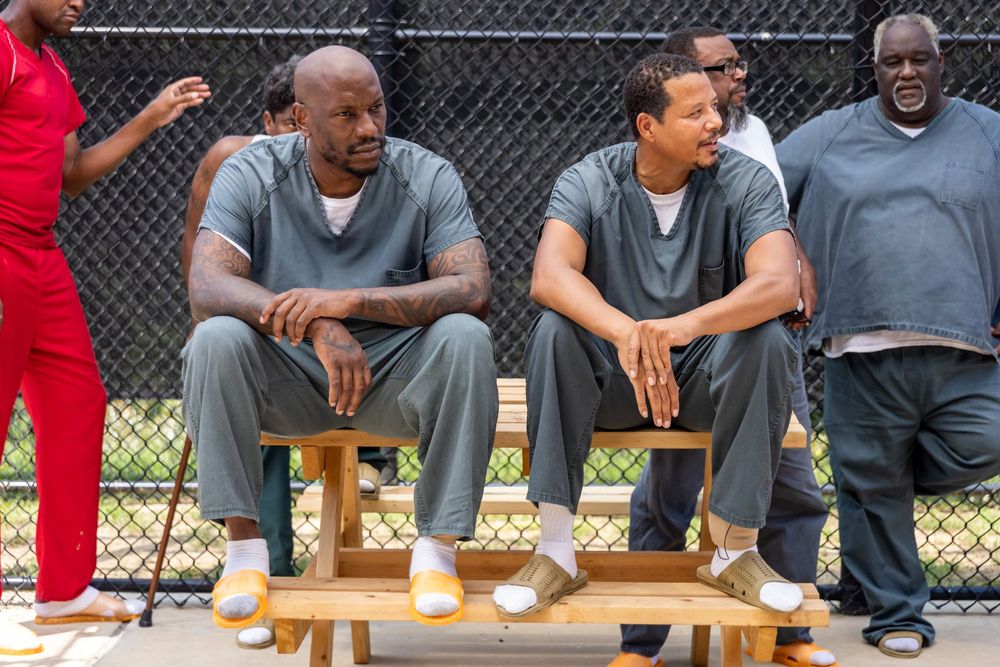Shot inside of an active prison in Jackson, Mississippi—with real inmates, a real warden, and real prison guards—The System is clearly about, well, the system.
Tyrese Gibson plays Terry Savage, a former marine who finds himself in the wrong place at the wrong time. After he robs a trap house, the police sit outside its door, guns cocked, ready to infiltrate the scene for a drug bust. While locked up, Savage cuts a deal with the police commissioner (Ric Reitz)—if he does time in a seedy private prison and reports back any human rights violations the warden (Jeremy Piven) is up to, Savage can go free, time served, and get reunited with his young daughter.
The human rights violations are colossal. The warden forces Savage to compete in an underground, multi-prison fight club, where inmates brutally beat each other, sometimes to death. With the help and wisdom of Bones (Terrence Howard), Savage quickly rises to the top of the food chain—but there’s something even more sinister going on.
The pulpy, action-packed film is a gargantuan middle finger to the prison-industrial complex and a commentary on how for-profit prisons, with their lax laws, aren’t too far off from slavery. LEVEL caught up with its two stars, Tyrese and Terrence, to chat about The System, its social commentary and Baby Boy.
LEVEL: What made you want to star in a film that has such a strong opinion on the prison-industrial complex?
Terrence Howard: You have no choice. You gotta say something because it's our family that's there. It's a reflection of us that's there. It's our shadow that's there, the mass of our nature is locked in that prison or the fear of us going there. You have to dive into these necessary areas if you want to effectively change this broken system. You know, because the system ain't broke—it's fixed. And it's fixed in a way that we can't win. We might as well go back to Michael Jackson singing to the damn crows, because that seems to be our anthem.
We didn't do this movie because we want to inspire people to go to jail. We want people to understand that shit is uncomfortable. And it's no place for Black people, period. —Tyrese Gibson
Tyrese Gibson: Yeah, I would agree, man. This wasn't a role for me. This was like, “Put them cameras on the reality of what's going on every day.” This shit ain't play-play, man. It ain't fun. It ain't hee hee, ha ha. I think right now, we're being raised by wolves. Where you got kids out here that know how to load a Glock and roll a blunt before they even know how to do algebra. Right now, we live in a generation where they've normalized being stupid. You want to be popular; be stupid. You want to be popular; do something crazy. Go viral. I don't remember the last time somebody went viral for graduating with a Ph.D. with honors.
Howard: Yeah.
Gibson: We also are being raised in a generation where people have a lot of validation issues, and they're trying to seek that validation on social media. Where if you don't like me, I don't like me. If you don't follow me, I'm not following myself. If you stop showing me love, I don't love myself. Everything about the way they feel about themselves is based on what they're getting or not getting from these exterior people or situations, and so there's a lot of people in prison and they’re like, what, what the fuck did I do? What did I do to get here? And was it even worth it? So you're in these environments that perpetuate this thing. And then the payoff of what the environment perpetuated, you're sitting in that cell, like, what the hell am I doing? None of your homies is coming to visit you. They all got records, they all running from the law, they never put money on your books, they don't even take your collect calls. They won't even take five minutes to pray for you. And then they probably having sex with your baby mama while you locked up because she's still in the hood with your kids. So everything about this movie, man, it's everything I grew up in and around. It’s something I understand, sadly, all too well.
Right. So, this is an action film. It has a lot more to say than something like Fast and Furious, though. Do you approach this differently or prepare for this differently?
Gibson: This didn’t have nothing to do with nothing other than me pulling from an environment that I grew up in. I remember one of my heroes, he's younger than me, but I still respect him. I had this heart-to-heart conversation many years back with Shia LaBeouf. He said every character of every role that you play is supposed to have a different color. If you give them the same color in every role, then it's just a blanket statement, and you're hitting all the same notes on the piano. So I wanted the bush out, look crazy. I wanted Terrence to make me uncomfortable. They gave me a bunch of options of people that were available for this role. And I said if Terrence Howard is available — as a matter of fact, his name wasn't even mentioned. I said, “Can you get Terrence Howard on the phone? Can you do whatever it takes to make sure he's here?”
I knew there would be a believable dynamic between him and I. We both come from the school of John Singleton—rest in peace to our brother. I have a great deal of respect for Terrence because, in his silence, he speaks. And there's no cars turning over, there's no special effects, there's nothing blowing up. It's just that raw, uncomfortable shit and acting that I wanted to get to.
The young men that might see this interview or might see this film, I hope that they take the moment to breathe and think about the consequences of their actions and what an emotional reaction may lead to. —Terrence Howard
Howard: You brought all of that, though. You brought the uncomfortability. You were the silent one. Your eyes were so deep, and you keep looking into it and trying to find this hope, this little message of hope. That's what you brought in this. You were the solid center and the foundation of this movie. And when you would talk to the prisoners afterwards, or in between some of the takes, it was all sincere. There was no fluff. You weren't making a movie; it felt like you were making a documentary. It was an honor to watch you take the lead and get back to your Baby Boy days of holding the scene and holding the frame in all truth. That's what I love about what we were able to do.
When [Howard’s character, Bones] said to you in prison, about surrender—this is not about black eyes and bloody noses. It's life or death. Then you have to accept that this is your reality if you want to change that reality. The young men that might see this interview or might see this film, I hope that they take the moment to breathe and think about the consequences of their actions and what an emotional reaction may lead to.
Since you brought up Baby Boy, Tyrese, I’d love to know what you think of Kendrick Lamar’s “We Cry Together.” The song and video are obviously inspired by Baby Boy.
Gibson: Kendrick is from Compton. I'm from Watts. We’re neighbors. The one thing I’ll say about Kendrick in general, not just that specific song, is sadly, we have a lot of people out here that become successful, and they from where I'm from. All they want to do is go pop, be glossy, you know, blonde hair, and try and cater to mainstream America and get away from their grit, get away from the fabric and the cloth in which they were born and raised in. Kendrick has been very, very consistent with his message. It's not in everybody's cards to be Dr. Martin Luther King Jr., but we could all do something. We can all speak on something.
I just love how unapologetic Kendrick is. I recently did something in that space with my brother CeeLo Green. I did a short film directed by Deon Taylor called Legendary. We had Breonna Taylor, George Floyd, Eric Garner, and Trayvon Martin in the video. It was one of the most uncomfortable videos I've ever done in my life because I've never shot a music video that featured four people that have passed away. I would love for y'all to watch it, and I definitely want y’all to go check out The System—me, Terrence Howard, Jeremy Piven, Lil Yachty did this thing. Hopefully, it's a deterrent. We didn't do this movie because we want to inspire people to go to jail. We want people to understand that shit is uncomfortable. And it's no place for Black people, period.


